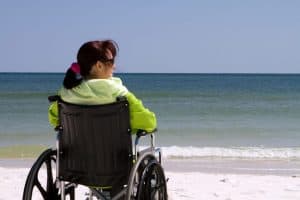
Get Disability Benefits With a Spine Disorder
Genetic, traumatic, and acquired spinal disorders are some of the most painful and disabling conditions that people suffer from. If you have a serious spinal condition that impairs your ability to work, you might be eligible for Social Security disability benefits. There are various criteria you will need to meet and a rigorous application process to go through to obtain Social Security disability for spine disorders in Pittsburgh.
Our team of disability lawyers at Berger and Green can help. Call our office at 412-424-6079 today and schedule a free consultation to discuss your case.
40+ years of experience from strong, knowledgeable, compassionate attorneys.
Start A Free EvaluationHow do I qualify as disabled for a spine disorder?
There are two ways to qualify as disabled for the purpose of Social Security disability benefits. The first way is to meet all the requirements for a listing in the Social Security Administration’s (SSA) Blue Book. This publication includes a long listing of impairments, and their criteria you must meet, for the SSA to consider you disabled.
There is a listing for “Disorders of the Spine” found in Section 1.04. Various spinal conditions fall under this listing including:
- Herniated nucleus pulposus
- Spinal stenosis
- Osteoarthritis
- Degenerative disc disease
- Facet arthritis
- Vertebral fracture
It is not enough to simply have a diagnosis of a spinal disorder. For the SSA to deem you disabled under this listing, you must have a compromised nerve root or spinal cord, and at least one of the following:
- “Evidence of nerve root compression characterized by of pain, limitation of motion of the spine, motor loss (atrophy with associated muscle weakness or muscle weakness) accompanied by sensory or reflex loss and, if there is involvement of the lower back, positive straight-leg raising test.
- Spinal arachnoiditis, manifested by severe burning or painful dysesthesia, resulting in the need for changes in position or posture more than once every two hours.
- Lumbar spinal stenosis resulting in pseudoclaudication, manifested by chronic nonradicular pain and weakness, and resulting in inability to ambulate (walk) effectively.”
We know you’re hurting. We can help. Free case evaluations, home and hospital visits.
Contact Us Now For HelpHow else can I qualify as disabled if I don’t meet a listing?
If your spinal condition does not quite meet the criteria under a listing, you can still qualify for benefits if you can prove to the SSA that your condition is so severe that it prevents you from working.
Upon review of a disability application for a non-listing-level spinal disorder, the claims examiner will assess your medical records and residual functional capacity (RFC) and assign you with a rating.
Your RFC rating indicates what kinds of simple tasks (sitting, pulling, pushing, lifting, standing, communicating, etc.) you can and cannot do in spite of or because of your impairment.
If your symptoms and complications from your spinal disorder are so severe that you cannot work (either at your old job or at any job), then the SSA may still grant you benefits.
You need an attorney with the experience and dedication to give your case the care it deserves.
Start A Free EvaluationWhat types of documentation do I need to prove my disability?
You will need to have thorough medical records that prove the severity of your condition and that notate how your condition is affecting your functional capacity. Your records should include items such as:
- Laboratory findings, e.g., x-rays, CT scans, MRIs, and electrodiagnostic procedures
- Examination of the spine with a detailed description of your gait and range of motion of the spine
- Your doctor’s input about “any other appropriate tension signs, motor and sensory abnormalities, and muscle spasms”
- Description of your treatments and response to them
- Results of a physical examination and a description of objective findings, e.g., ability to squat and get out of a squat, etc.
The importance of adequate medical records cannot be understated. Without them, the SSA will deny you benefits. Our team knows what medical documents the SSA expects and will help you collect them. We will also help collect any non-medical documents we think will help substantiate your claim.
We can address all the legal hurdles that may be keeping you from getting a fair settlement.
Speak To An Attorney TodayWhat additional criteria must I meet to qualify for disability benefits?
The general criteria for Social Security disability benefits consist of the following:
- You must meet the SSA’s definition of disabled by either meeting a listing, or having such a low RFC that you cannot work; and
- A doctor must expect your condition to last a year or longer or result in death.
There are also additional detailed criteria, depending on under which disability program you are filing for benefits. If you are applying for Social Security Disability Insurance (SSDI) benefits, a program for disabled workers, you must have a given number of work credits on your record. The number of credits you need depend on your age. For instance, claimant in her 30s will need 20 credits; a claimant in his early 60s will need 40.
If you have limited or no work history, a limited income, and few resources, you might instead qualify for Supplemental Security Income (SSI) benefits. Your income and assets will need to be below a certain threshold to be eligible.
What do I do if the SSA has denied my application for disability benefits?
The SSA initially denies about 70 percent of disability applications. Most often, technical errors or lack of sufficient medical evidence are the basis for denials.
If the SSA recently denied your application for benefits for your spine disorder or shut your benefits off prematurely, you have the right to appeal the SSA’s decision.
Contact Berger and Green in Pittsburgh to discuss your case and determine how best to approach your appeal. (The call is free, and we do not charge legal fees unless you win your case, so there is no risk in exploring our services.)
There is a strict 60-day time limit on appeals, starting from the day your received the letter of denial. The sooner you take action, the more time we will have to gather additional supportive evidence to substantiate your claim. Call us today at 412-661-1400 to get started.









